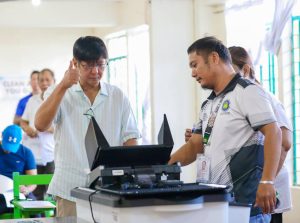The results of the recently concluded midterm national and local elections reflected the increasing polarization in Philippine politics.
This was evident in the Senate, where no single party or bloc dominated the competition. The coalition led by President Ferdinand “Bongbong” Marcos Jr. and the camp of Vice President Sara Duterte won five candidates each, while two independent candidates succeeded in getting into the top 12 winning threshold. The latter are returning senators known for their critical views during the administration of former President Rodrigo Duterte.
This could be the reason why the vice president expressed disappointment with the Senate race. “While the outcome was not what we had hoped for, our commitment to the people remains unwavering,” she said in a statement.
The ruling coalition claimed victory in the polls and described it as a vote of confidence for the administration. However, the presidential communications undersecretary welcomed the “diverse political affiliations” of the winning senators, which could be an acknowledgement that the president’s endorsement did not lead to a decisive victory in the polls.
Marcos and Duterte teamed up in the 2022 election but their alliance collapsed last year, leading to the vice president’s resignation from the Cabinet.
As expected, the results of the local elections favored the administration coalition. The speaker of the House of Representatives, who is a first cousin of Marcos, credited the strong showing of their candidates to the achievements of the incumbent government. As in previous elections, pro-administration candidates were favored to win because of their access to government machinery and resources.
Despite his arrest and detention in The Hague under the custody of the International Criminal Court (ICC), former President Duterte won re-election as mayor of Davao City. His two sons and two grandsons were also successful in the elections. But if the Dutertes dominated Davao, their allies in various parts of Mindanao Island were defeated. Vice President Duterte actively campaigned in different parts of the country but her endorsement achieved mixed results.
The clear winners in the midterm elections were political dynasties, which continued to dominate local and national positions. These powerful families fielded candidates at all levels and spent billions of pesos during the campaign period, which gave them an unfair advantage over ordinary candidates from small parties. Rampant vote buying, intimidation, red-tagging, and disinformation undermined the electoral process. The automated election system encountered glitches and underscored the demand for a hybrid model that would allow the public to manually count and verify votes.
Amid the squabble of the Marcoses, the Dutertes, and their proxies, opposition forces welcomed the surprise victory of the two independent senators and the expansion of the progressive partylist bloc in the House of Representatives. They attributed their electoral success to the support of youth voters. The Makabayan coalition said it secured at least two partylist seats and defeated the vicious efforts of militarists in government to wipe out Leftists in Congress.
After the midterm elections, the next flashpoint in Philippine politics is the impeachment trial of Vice President Duterte in June and July. It is still unclear if there are enough votes in the Senate to convict Duterte, who is on trial for alleged misuse of public funds, conspiracy to assassinate the president, and other high crimes. But the election of her five allies would certainly boost her chances, aside from having more voices in the Senate lambasting the government’s decision to cooperate with the ICC in arresting her father.
Duterte’s presidential bid in 2028 depends largely on her success in surviving the impeachment. But what the midterm election results showed was the sudden emergence of an alternative to the feuding Marcos and Duterte clans. Duterte may be the frontrunner now but the recent elections highlighted her family’s eroded influence across the country and the rise of young voters clamoring for change.

































